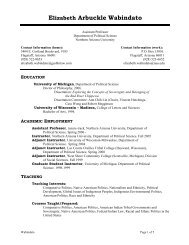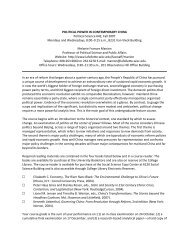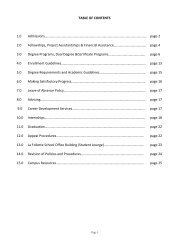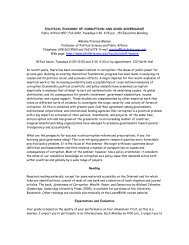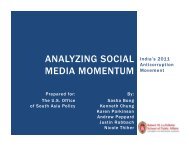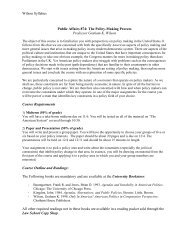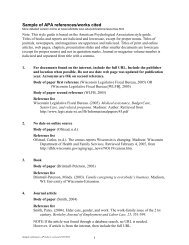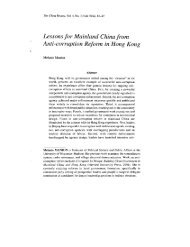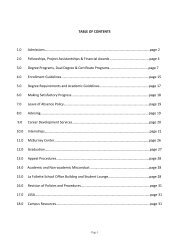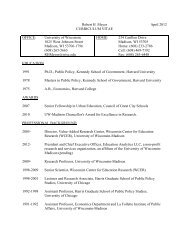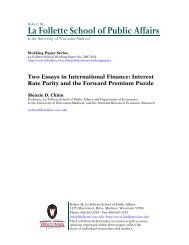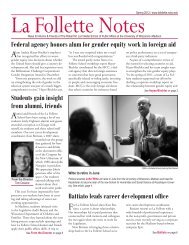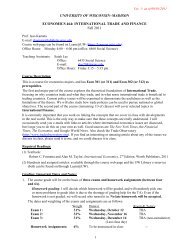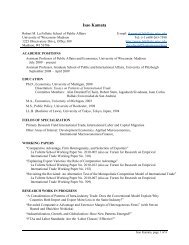SAVE Commission's findings - La Follette School of Public Affairs ...
SAVE Commission's findings - La Follette School of Public Affairs ...
SAVE Commission's findings - La Follette School of Public Affairs ...
You also want an ePaper? Increase the reach of your titles
YUMPU automatically turns print PDFs into web optimized ePapers that Google loves.
CHAPTER<br />
FOUR<br />
GOAL #19<br />
Federal<br />
Relations<br />
Focus efforts to get<br />
more funds and use<br />
new authority<br />
State<br />
employee<br />
“We must<br />
conform to<br />
federal regulations and<br />
mandates, so<br />
paperwork reduction<br />
starts at the top.”<br />
Thomas R. Hefty<br />
Commission for the<br />
Study <strong>of</strong> Administrative<br />
Value and Efficiency<br />
Commissioner<br />
isconsin must act with speed and determination<br />
to get more federal<br />
funds in the categories we think are<br />
important, while noting the possible<br />
downsides and unwanted strings attached<br />
to the funds. The state also<br />
must avoid being too narrowminded<br />
and tied up by red tape as we plan to<br />
act on the new autonomy that may be unleashed<br />
by the federal government. Finally, we must say<br />
“stop” to unfunded mandates at federal and<br />
state levels and stop the flow <strong>of</strong> regulations that<br />
prefer paperwork over results.<br />
Like other states, Wisconsin’s relationship<br />
with the federal government is changing daily<br />
as our national government tries to downsize<br />
and begins plans to return to the states powers<br />
assumed since the 1930s. While this delegation<br />
<strong>of</strong> authority and responsibility is not completed,<br />
it is welcome; state and local governments<br />
should thoughtfully consider what they<br />
are going to do with it.<br />
The Commission suggests three actions:<br />
1) give more time and attention to federal issues;<br />
2) get more federal money for the things<br />
we think are important; and 3) seek mandate<br />
relief at federal and state levels.<br />
ENHANCE THE STATE’S FEDERAL WATCH<br />
State government’s contacts with Congress<br />
and federal agencies are generally decentralized<br />
and low key. <strong>La</strong>udable efforts have been made<br />
by governors and congressional representatives<br />
to “look out for the state” but, generally speaking,<br />
voters have said lobbying for federal money<br />
is not a top priority.<br />
For the immediate future, state and local<br />
governments should accelerate their federal<br />
watch as Congress and the administration decentralize.<br />
Wisconsin needs to help Washington<br />
ask the right questions about the direction<br />
it is taking (as Pr<strong>of</strong>essor William Cronon advised<br />
the Commission). Why? Because how the<br />
federal bureaucracy is dismantled will have<br />
great consequence, especially for Wisconsin,<br />
which has high quality services.<br />
Wisconsin could benefit significantly from<br />
federal delegation that begins giving away authority<br />
through pilot projects. States like Wisconsin<br />
that take human services, education,<br />
environmental protection and transportation<br />
seriously could be in a better position to be real<br />
laboratories <strong>of</strong> democracy. On the other hand,<br />
Wisconsin and other high service states could<br />
be hurt if decisions on the future <strong>of</strong> the block<br />
grant and other programs don’t recognize state<br />
efforts.<br />
The state also should be watchful because<br />
the dismantling <strong>of</strong> federal programs may come<br />
without the relief necessary in the law, federal<br />
code or bureaucratic reporting procedures. That<br />
would be like opening a present that has nothing<br />
inside. Unless the state is alert, delegation<br />
could open a fiscal and legal mess.<br />
Wisconsin also has to be careful not to<br />
mimic Washington’s narrowness. State and local<br />
governments (including schools) are capable<br />
<strong>of</strong> protecting their own turf and not seeing the<br />
big picture. Delegation presents an opportunity<br />
to look at what results the states want to achieve<br />
with money and authority, but there is a real<br />
risk that state agencies will adopt the narrow<br />
thinking <strong>of</strong> their federal cousins.<br />
Finally, the state’s federal relations function<br />
must be tied into the state management<br />
system and its relation to local government.<br />
That will ensure that Washington’s narrow views<br />
are not sustained here at home.<br />
50 CITIZEN • COMMUNITY • GOVERNMENT — WISCONSIN: THE 21 ST CENTURY



